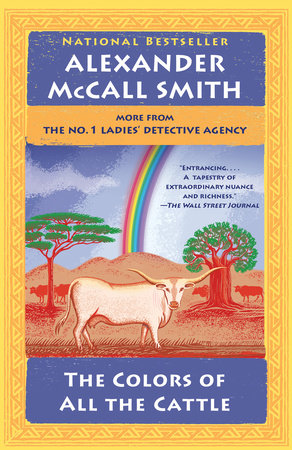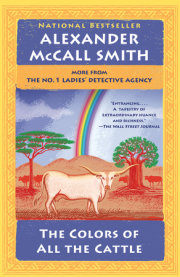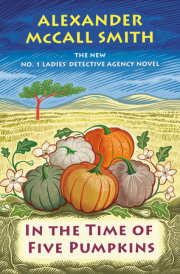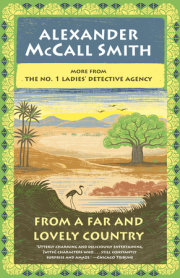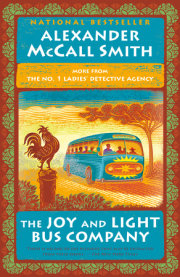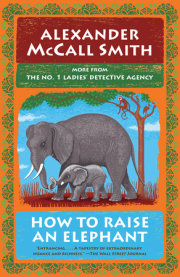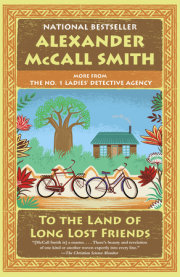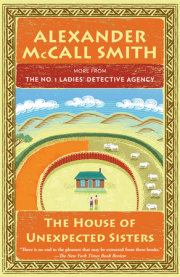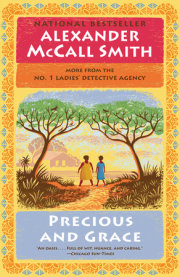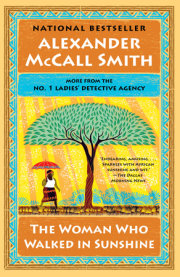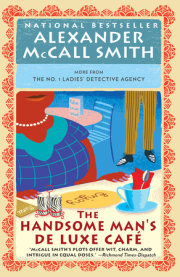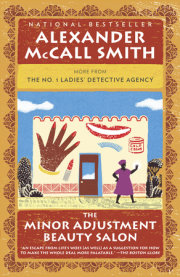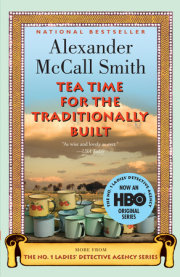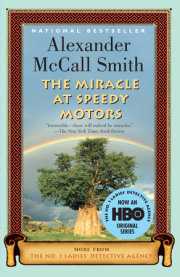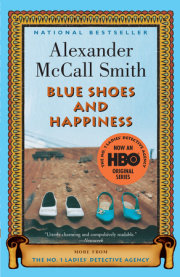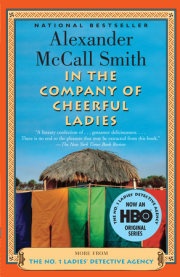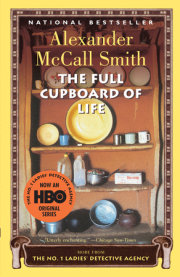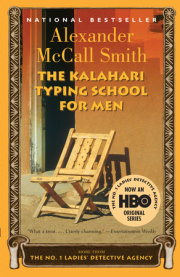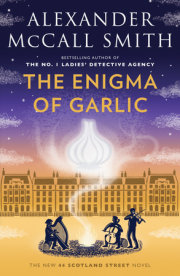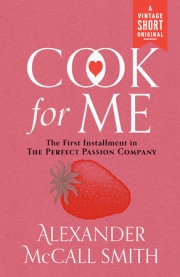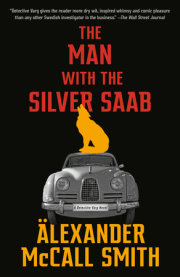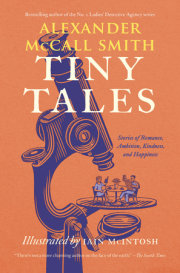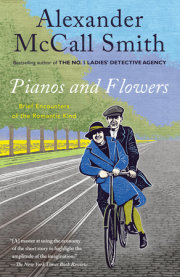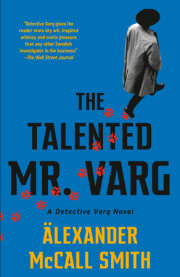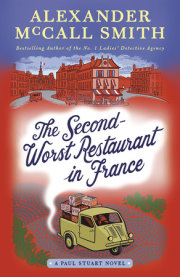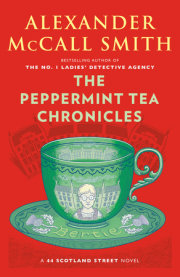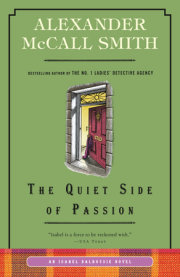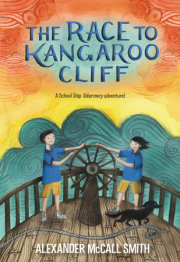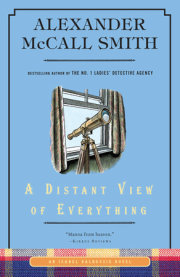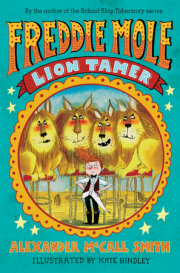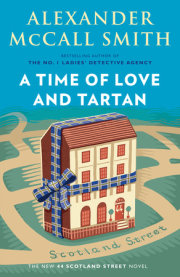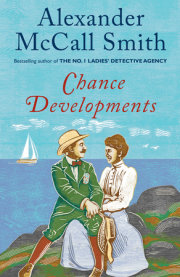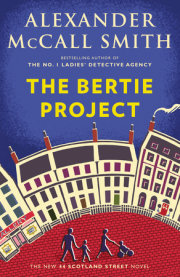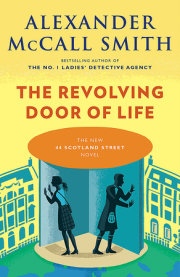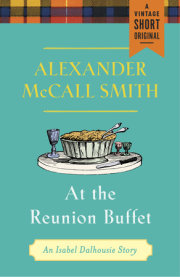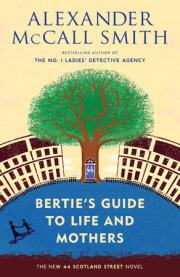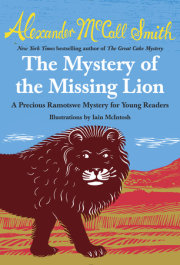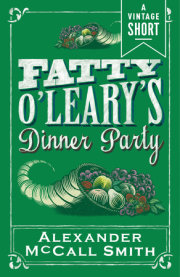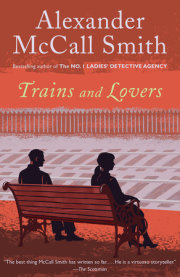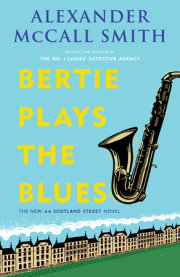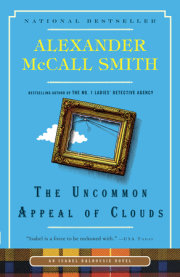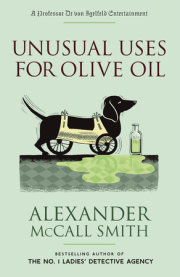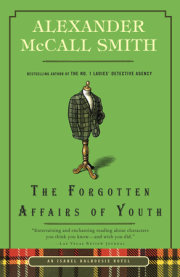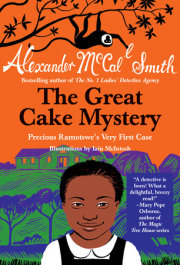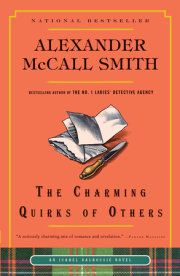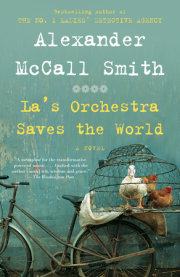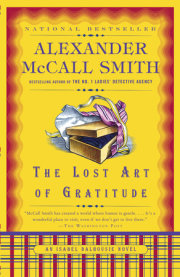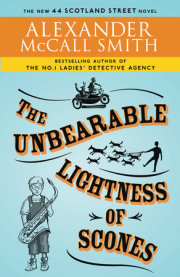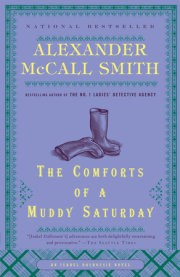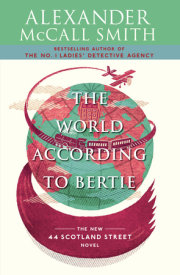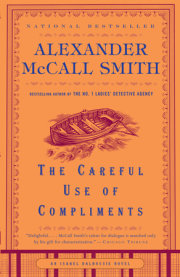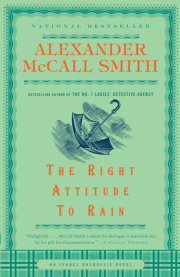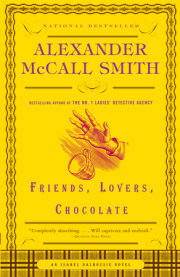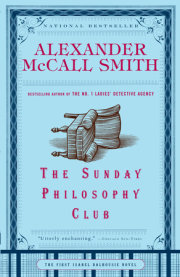CHAPTER ONEPICKED UP BY THE WIND AND BLOWN AWAY Mr. J.L.B. Matekoni, owner of Tlokweng Road Speedy Motors, and one of the finest mechanics in Botswana, if not the finest, was proud of his wife, Precious Ramotswe, progenitor and owner of the No. 1 Ladies’ Detective Agency. Many men are proud of their wives in one way or another, although not all of them are as vocal in their pride as their wives might like them to be. This is a failing of men, and must be added to the list of men’s failings, although all of us have failings and weaknesses—men and women alike—and it is not always helpful to point them out.
But of Mr. J.L.B. Matekoni’s pride in Mma Ramotswe there could be little doubt. Sometimes, for instance, he would just gaze at her in silence and think,
There is no other lady quite like Mma Ramotswe in all Botswana. That thought alone filled him with pride, just as much as it was a comfort to him. To think that of all the women in the country she should have come into his life—that was a humbling realisation, and reminded him of just how great a role chance plays in our human existence. It could so easily have been otherwise: she might have decided not to go out on that fateful day on which they had met. She might have gone elsewhere, encountered somebody else altogether, and married that somebody else. And yet she had not. They had met, and after a great deal of anxious hesitation he had eventually plucked up enough courage to ask her to be his wife. And she—oh, heaven-sent good fortune—had agreed.
As to his pride, there were so many reasons for this. Mma Ramotswe was a fine- looking woman, a woman of traditional build, a woman of sound and sensible views, a woman who embodied all that was praiseworthy in the national character. Yet she was also human. She was reluctant to condemn other people for not being quite as good as they might be. She was not one to expect unattainable standards. She understood that many of us would like to be better in our personal lives but somehow could not seem to achieve it. She recognised that sometimes the best we could do was simply to muddle through, getting some things right but also getting many things wrong. She knew all that, and was never too quick to blame or offer reproach.
She was kind; she was forgiving. She did not think that people should be punished too severely for their actions, as long as they acknowledged that what they had done was wrong.
If you punish somebody harshly, she said,
then you are simply inflicting more pain on the world. You are also punishing not only that person, but his family and the people who love him. You are punishing yourself, really, because we are all brothers and sisters in this world, whether we know it or not; we are all citizens of the same village. He liked her ability to exercise forgiveness, but there were other qualities that explained the pride he felt in her. One of these was the fact that she was a good cook—not necessarily one of the very best cooks in the country, but certainly somewhere in the top ten percent. Being a good cook, he thought, was not something that could necessarily be taught. You could watch other cooks, you could study recipes and experiment with new ways of doing things, but that did not necessarily mean that you would become a good cook. Being a good cook was not dissimilar to being a good mechanic—you had to have a
feeling for what you were doing, and that was something that you either had or you did not. He thought of his two apprentices, Charlie and Fanwell. Fanwell had a feeling for engines—he sympathised with them; it was as if he knew what it felt like to be in need of an oil change or to be labouring under the disadvantage of ill-fitting piston rings. Charlie, for all his bluster and his bragging, never really had that. An engine could be telling him something as plainly and as unambiguously as it could, but he would fail to pick up the unmissable signs of distress. And then, when the inevitable mechanical failure occurred, rather than trying to understand what signs had been overlooked, he would
bully the engine. There was no other word for it: he would bully it by removing bolts and nuts brutally; he would rip out a fuel hose, an engine’s crucial aorta, rather than coaxing it gently off its nozzle; he was not even averse to applying a hammer blow here and there in the hope of shifting some mechanical log-jam within the engine block.
Fanwell was much more gentle. At a very early stage in his training he had grasped the need to listen to what a vehicle was saying. He understood that at heart engines wanted to oblige us; it was their destiny to fire properly and to run sweetly for as long as their owner wished. Engines knew that, and, if only you treated them correctly, they would do your bidding. But hit an engine, or subject it to any of the other cruelties that thoughtless owners could devise, and the engine would become as stubborn as a mule.
It was the same, Mr. J.L.B. Matekoni thought, with cooking. If you were gentle, if you blended ingredients together gently, folding them in with all the delicate care of a mother tucking a child into bed, then they would co-operate. If you took the trouble to understand what temperature cooking oil liked, then it would seal the beef perfectly or soften the onions to just the right consistency. If you tasted a soup regularly, adding salt and pepper pinch by pinch rather than all at once, then the result would be perfectly seasoned rather than too salty or too hot. This was an art, he was convinced, and it was one to which Mma Ramotswe seemed to have been born.
Of course, instruction was required. Children might be endowed at birth with the instincts of a good cook, but this inherent talent still had to be nurtured through tuition. Usually it was the mother who did this teaching, and usually it was the daughter who learned, but these days, much to Mma Ramotswe’s delight, boys were at long last being encouraged to cook. Puso, their foster son, had already learned at school how to make a number of dishes, and, even if his efforts so far had not proved universally edible, at least some were. He was proud of his ability and beamed with pleasure when Mma Ramotswe told him how much she appreciated his custard with jam or his only slightly burned sausages served with soggy fried potatoes. Of course, there were certain traditionally minded people, some of them curmudgeons by instinct, who thought it wrong that boys should be taught to cook, but these people were out of touch with the modern world and their opinions no longer needed to be given much weight. And this came rather close to home—at first, Mr. J.L.B. Matekoni himself had been doubtful as to the appropriateness of teaching boys to cook, but he had soon been set right on that by Mma Ramotswe.
“Do men eat?” she asked him one day.
He looked up, surprised. “Of course men eat, Mma. Everybody must eat.”
She nodded. “I agree with you, Rra. Men like to eat—some men like it a lot.”
“In particular,” said Mr. J.L.B. Matekoni, “they like to eat meat. Men are very keen on eating meat.”
“That is true, Rra. Men seem to need meat. And if you need to eat, then I would have thought you need to be able to cook—even if you are a man.”
They exchanged glances. He was not sure where this conversation was going, but he detected in it an element of gentle reproach.
“Mind you,” he ventured, “there are some men who do not eat meat. They’re called vegetables.”
Mma Ramotswe laughed. “Vegetarians, Rra.”
He looked puzzled. “Yes, vegetarians. That’s what they’re called.”
“You said they were vegetables.”
“Did I? Then I was wrong, Mma. I meant to say vegetar . . .” He stumbled on the word.
“Vegetarians.”
“Yes, that. There is a vegetarian here in Gaborone who drives an old Land Rover. He lives out near the Sanitas Garden. They say that he has never eaten meat in his life—even when he was a boy.”
Mma Ramotswe smiled. “I think that man is a Hindu. They are like that as a matter of belief. They think that cows are sacred.”
Mr. J.L.B. Matekoni could go some way towards sympathising with that—cows were special, there was no doubt about that—but he was not sure whether he would go so far as to consider them sacred.
“He is a very gentle person, that man,” he went on. “But his Land Rover is very old and I think it’s losing heart. You can always tell when a vehicle loses heart.”
“He should get a new one.”
Mr. J.L.B. Matekoni smiled. “I told him that. I said that there were some very smart new Land Rovers. But he just shook his head and said that his Land Rover was an old friend and he would not desert it. That is an attitude that I can understand, Mma.”
Mma Ramotswe knew what he meant. She felt that same thing about her tiny white van. She had resisted his attempts to change it for a more modern version—well- intentioned attempts, yes, but nonetheless misplaced.
“This man with the Land Rover,” Mr. J.L.B. Matekoni continued, “he is very weak, I think. Not weak in his mind, but in his body, Mma. He looks as if the wind could blow him over if it ever tried. You know that look? There are some people who seem to be at real risk from the wind.”
“He is getting on a bit,” said Mma Ramotswe. “He is almost as old as his Land Rover—maybe even older.”
“It’s not age,” said Mr. J.L.B. Matekoni. “I think it might be lack of meat, Mma. If he ate some good Botswana beef, then he would be stronger. If you eat Botswana beef, then you will never be blown away by the wind.”
For a moment they were both silent. Mma Ramotswe was remembering something. A long time ago she had been told a story—it was one of those stories you heard as a child—this one about two children who had been picked up by the wind and blown out into the Kalahari. They had wandered about in that dry land for days and had just been about to succumb to thirst when they had been met by a band of San people. These hunters had taken them in and shown them where their water was hidden. They had empty ostrich shells buried under the sand and these were filled with precious water. They had saved the lives of those two children and had kept them with them for years, looking after them because they had no idea where the wind had picked them up and where they might return them to. Eventually the children had grown and, because they were not San people, who are short, they had towered over their rescuers. What had happened then? She could not remember. She thought that it had been decided to send them back to their Batswana roots because you cannot take tall people on the hunt—the animals will see you and will run away. Someday she would have to find out what happened.
She looked at Mr. J.L.B. Matekoni. This view—that men
had to eat meat—was an old-fashioned one, but she doubted whether she would ever be able to get her husband to see that. Some beliefs were very deeply ingrained, and, although you could expect men to make some adaptations, they were not always capable of making themselves entirely modern. Another thing was certain, too: she would never succeed in converting him to vegetarianism, even had she wished to do so. That would take centuries, and none of us had centuries; which was fortunate, in a way, at least for men, because most men, if they lived for centuries, would be centuries out of date at the end of their time, and that would be insupportable, she thought, for their wives, and possibly for others too. If Mr. J.L.B. Matekoni had, as he undoubtedly did have, this high opinion of Mma Ramotswe, and if, as was certainly the case, he thought that there was no respect in which she could possibly be improved, she did not share this view of herself.
Copyright © 2018 by Alexander McCall Smith. All rights reserved. No part of this excerpt may be reproduced or reprinted without permission in writing from the publisher.

